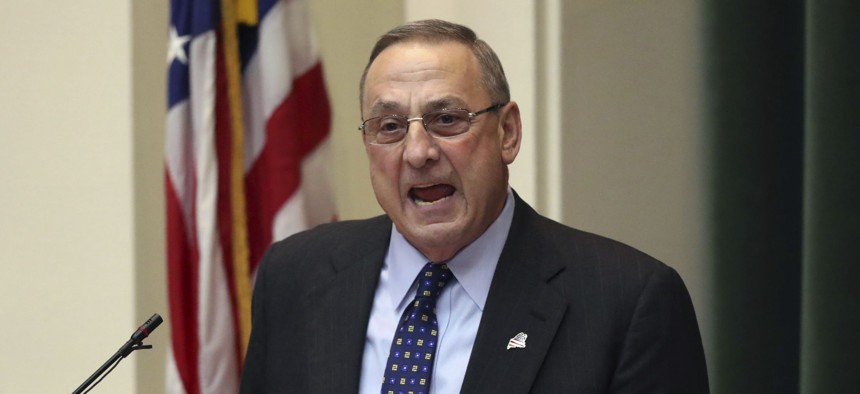Maine Gov. LePage: Liberals Are Trying to Turn State Into ‘Socialist Utopia’

Maine Gov. Paul LePage delivers his State of the State Address in Augusta on Tuesday. Robert F. Bukaty / AP Photo

Connecting state and local government leaders
Known for his combativeness, the Republican governor offered a bit of an olive branch during Tuesday’s State of the State address: “Let’s try to figure out a way that we can work together.”
Maine Gov. Paul LePage during his State of the State address Tuesday lashed out at the political left, said the state’s ballot referendum system needs reforms and called for tax cuts.
The Republican governor also stressed the importance of looking out for Maine’s elderly residents and voiced support for upping teachers’ salaries. And he made a case that the state needs to attract new businesses and younger people to help offset its aging population.
Speaking to members of the state Legislature in Augusta, the governor struck a combative tone at the outset of his address.
“Our economy and our way of life is under attack,” he said. “Maine was once renowned for its rugged individualism. Liberals are now trying to transform our state into a socialist utopia.”
But, toward the end of the speech, he made a conciliatory plea to the members of the Legislature: “I ask you tonight, over the next two years, I ask you: do no harm. Do no harm to the economy. Let’s try to figure out a way that we can work together.”
Democratic leaders were less than enthusiastic about the governor’s remarks. Maine’s House is controlled by Democrats and the Senate by Republicans.
“I think Maine people deserve better than that. Maine people are not interested in political differences. Maine people want more than just ‘do no harm,’” House Speaker Sara Gideon told reporters after the address. “I think what we were all hoping to hear tonight was really a transformative vision for the state of Maine.”
She pointed to rural redevelopment and college affordability as areas where she felt the governor’s plans fell short.
Known for making sometimes controversial remarks, LePage was first elected governor in 2010. His second four-year term will end in early 2019, when he will be term-limited out of office.
LePage has opposed two ballot initiatives state voters approved in November. One increases the state’s minimum wage and the other authorizes a surcharge to help fund education on annual household incomes over $200,000.
The governor says the measures will hurt Maine’s economy.
“Liberals,” he argued Tuesday, “are doing an end run around the Legislature by hijacking the citizens’ referendum process.”
Democratic Senate Minority Leader Troy Jackson pushed back on the governor’s view of ballot measures at the post-speech news conference. “Look, I’m a voter. And I don’t feel like the Legislature’s been doing their job,” he said.
Jackson added: “People have felt left behind, frustrated and that’s how they’re fighting back, is by going to the referendum.”
As his address went on, LePage became less pugnacious.
He suggested Maine is at risk of losing wealthier residents by over-taxing them. And he reiterated his support for eliminating the state’s income tax, an idea that has previously met opposition among lawmakers.
“I believe eliminating the income tax is the largest pay increase that Mainers will ever get,” he said.
A budget proposal the governor issued last month called for reducing the top individual income tax rate from 10.15 percent to a flat tax of 5.75 percent and cutting the corporate income tax rate from 8.93 percent to 8.33 percent.
LePage’s spending plan also proposes axing 500 positions in state government.
Gideon, the House speaker, questioned whether lowering income taxes is what would best help the finances of most state residents.
“When you look at the budget as proposed,” she said, “with this income tax slashing and you look at what I’m going to call ‘an everyday Mainer,’ someone who makes about $60,000 a year, they’re going to get $8 back under the governor’s proposal. You look at somebody who makes half-a-million dollars a year, they’re going to get $14,000 back.”
Ensuring the wellbeing of the state’s seniors was a key issue in the governor’s address, one he linked to his opposition for the minimum wage. Under the ballot measure that passed in November, the hourly pay floor would increase gradually from $7.50 to $12 by 2020.
LePage said 358,000 Mainers live on Social Security checks that average about $1,130 per month and the minimum wage hike would raise their living costs. “Higher prices will push our elderly deeper and deeper into poverty,” he said.
Elsewhere in his speech, the governor touted steps his administration has taken to shore up the state’s pension system for public employees, build budget reserves and toughen welfare program requirements.
The governor also said too much of the money going to public schools in Maine is getting spent outside of classrooms. He took specific aim at school superintendents, saying there were 148 in the state.
The budget plan LePage released last month includes proposed changes to the state formula for funding schools.
On Tuesday, he endorsed higher pay for teachers. “Pay ‘em what they’re worth,” the governor said. “We simply don’t pay.”
Other issues the governor touched on included combatting the opioid drug abuse problems that have plagued Maine, his support for a program that would enable businesses to help their employees pay off student debt, and keeping energy costs affordable.
LePage said his administration has worked hard to draw new employers and young professionals to the state.
“We are aging out,” the governor, who is in his late 60s, said of Maine's population. “We are an old state. We need new blood.” He added: “We must give our young people a reason to stay in Maine.”
Bill Lucia is a Senior Reporter for Government Executive's Route Fifty and is based in Washington, D.C.

NEXT STORY: The High Price of a Montana Liquor License; S.C. Gov. Hits Trump up for $5 Billion for Infrastructure





